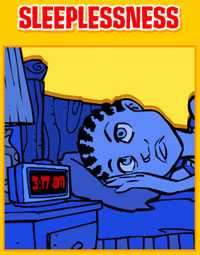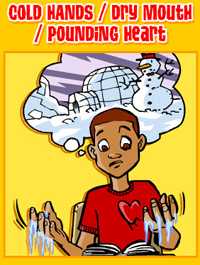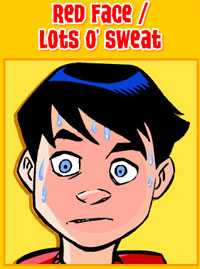Feeling Stressed Out?

Got Butterflies?
Tongue-Tied?
Pounding Headache?
Learn what short-term and long-term stress does to your body and how to cope with it through this interactive feature!
Click here to launch the feature!
Learn More:
What is Short-Term Stress?
Have you ever started a new school, argued with your best friend, or moved? Do you have to deal with the ups and downs of daily life — like homework or your parents’ expectations? Then you already know about stress. In fact, everyone experiences stress. Your body is pre-wired to deal with it — whether it is expected or not. This response is known as the stress response, or fight or flight.
The fight or flight response is as old as the hills. In fact, when people used to have to fight off wild animals to survive, fight or flight is what helped them do it. Today, different things cause stress (when was the last time you had to fend off a grizzly bear?), but we still go through fight or flight. It prepares us for quick action — which is why the feeling goes away once whatever was stressing you out passes! It can also happen when something major happens — like if you change schools or have a death in your family.
Everyone has weird feelings when they are stressed. Fight or flight can cause things like sweaty palms or a dry mouth when you are nervous, or knots in your stomach after an argument with someone. This is totally normal and means that your body is working exactly like it should. There are lots of signs of stress — common types are physical (butterflies in your stomach), emotional (feeling sad or worried), behavioral (you don’t feel like doing things), and mental (you can’t concentrate). Most physical signs of stress usually don’t last that long and can help you perform better, if you manage them right.
So, when you feel stress, what happens to make your body do the things it does? According to the experts, three glands “go into gear” and work together to help you cope with change or a stressful situation. Two are in your brain and are called the hypothalamus (hipe-o-thal-a-mus) and the pituitary (pi-to-i-tary) gland. The third, the adrenal (a-dree-nal) glands, are on top of your kidneys. The hypothalamus signals your pituitary gland that it is time to tell your adrenal glands to release the stress hormones called epinephrine (ep-in-efrin), norepinenphrine (nor-ep-in-efrin), and cortisol (cor-ti-sol). These chemicals increase your heart rate and breathing and provide a burst of energy — which is useful if you’re trying to run away from a bear! These chemicals can also control body temperature (which can make you feel hot or cold), keep you from getting hungry, and make you less sensitive to pain. Because everyone is different, everyone will have different signs. Not to worry — everyone experiences these physical signs of stress sometimes. The good news is that, once things return to normal, your body will turn off the stress response. After some rest and relaxation, you’ll be good as new.
What is Long-Term Stress?
But what happens when life continues to throw curves at you and if you have one stressful event after another? Your stress response may not be able to stop itself from running overtime, and you may not have a chance to rest, restore, and recuperate. This can add up and, suddenly, the signs of overload hit you — turning short-term stressors into long-term stress. This means that you may have even more physical signs of stress. Things like a headache, eating too much or not at all, tossing and turning all night, or feeling down and angry all the time, are all signs of long-term stress. These signs start when you just can’t deal with any more.
Long-term stress can affect your health and how you feel about yourself, so it is important to learn to deal with it. No one is completely free of stress and different people respond to it in lots of different ways. The most important thing to learn about long-term stress is how to spot it. You can do that by listening to your body signals and learning healthy ways to handle it.
Click here for more on how to cope with stress.
- Page last reviewed: September 20, 2017
- Page last updated: September 20, 2017
- Content source:



 ShareCompartir
ShareCompartir








